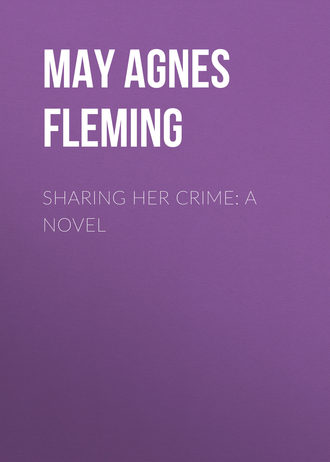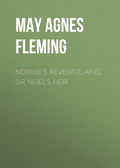
May Agnes Fleming
Sharing Her Crime: A Novel
CHAPTER XXXIV.
LIGHT IN DARKNESS
"By the strong spirit's discipline —
By the fierce wrong forgiven —
By all that wrings the heart of sin,
Is woman won to Heaven." – Willis.
There was a moment's profound silence, during which Louis stood like one thunderstruck, and Minnette glared upon him with her fierce black eyes.
"And you have been with me all this time, Minnette, and I knew it not," said Louis, at length.
"No," she said, with a bitter laugh. "You did not know me. Had it been Celeste, do you think you would have recognized her?"
"Minnette, do not look so wildly. Good heaven! who would ever think of seeing you here, and in such disguise?" he added, still scarcely able to realize it was Minnette who stood before him.
"And it was for your sake," she replied, in a voice almost choked by contending emotions.
"For me, for me! wretch that I am!" he said, with bitter remorse. "Oh, Minnette! I am unworthy such devoted love."
Something in his manner inspired her with hope. She clasped her hands, and said, wildly:
"Only say you will not cast me off. Only say you will yet love me, and I will be a thousand-fold repaid for all I have endured for your sake. Oh, Louis! is it for the cold, prudish Celeste you reject such love as mine?"
"We cannot compel our affections, Minnette. Celeste is the only woman who can ever possess my heart; but you – you shall always be to me as a dear sister. You must throw off this disguise, and return with me home immediately. Your friends shall never know of this – they do not dream you are here; and you will soon learn to look back to this time as a troubled dream, happily past."
"Ha, ha, ha! You might take me back to America, that I might witness your marriage with Celeste. No, Louis Oranmore, never shall she enjoy such a triumph! I have hated her all my life; and I shall hate her with my last breath. Do you think I could live and survive this disgrace? You have driven me to madness; and now behold its fruits."
Her voice was hoarse with concentrated passion; her eyes burning like fire; her face ghastly and livid. As she spoke, she drew from within the doublet she wore a gleaming dagger. As the quick eye of Louis saw the motion, he sprang forward and seized her by the wrist. She struggled madly to free herself from his grasp; and in the struggle the point of the dagger entered her eye.
A torrent of blood flowed over his hands. Shriek after shriek of mortal agony broke from the lips of Minnette. The fatal dagger dropped from the hand of Louis – he staggered back, and stood for a moment paralyzed with horror. Mad with agony, Minnette fled round the room, the blood gushing from her sightless eye and covering her face, her agonizing screams making the house resound. It was an awful, ghastly, appalling spectacle. Louis stood rooted to the ground, unable to remove his gaze from the terrible sight.
Her piercing shrieks soon filled the room. Among the crowd came Lugari, who instantly guessed what had happened. A surgeon was sent for, and poor Minnette, struggling madly, was borne to her room and laid upon her bed. The surgeon, an Englishman, at length arrived; and Louis, at last restored to presence of mind, speedily expelled the gaping crowd, and shut himself up in his own room, unable to endure the harrowing sight of Minnette's agony. For upwards of two hours he trod up and down, almost maddened by the recollection of the dreadful scene just past. Bitter, indeed, was his anguish and remorse; in those two hours seemed concentrated ages of suffering.
Suddenly the sound of footsteps announced that the physician was about to take his leave. Hurriedly leaving the room, Louis followed him, scarcely daring to ask the question that hovered upon his lips.
"Tell me!" he exclaimed, vehemently, "is she – will she – "
"No, she will not die," replied the doctor, who knew what he would ask. "The wound is dangerous, but not mortal. She must be taken care of. I will have her immediately removed from here."
"Then she will recover!" said Louis, fervently, "Thank God!"
"Yes, she will recover," said the doctor, hesitatingly, "but – "
"But what?" exclaimed Louis, in vague alarm.
"She will be blind for life!"
"Great heaven!"
"Her right eye is already gone, and the other, I fear, will never more see the light. Still, you should be grateful that her life will be preserved." And the surgeon took his hat and left.
"Blind! blind for life!" murmured Louis, in horror; "a fate worse than death. Oh, Minnette! Minnette!"
The lingering glory of an Italian sunset was streaming through the open window of the room where Minnette lay. It was a plainly, but neatly furnished room, in one of the Scuole, or benevolent institutions of the city. Two months had passed since that unhappy day on which we saw her last. She lies now on the bed, the sunlight falling brightly on her wan face; that blessed sunlight she will never see more. A Sister of Mercy, with holy face and meek eyes, sits by her side, holding one of her hands in hers.
And this is Minnette; this pale, faded, sightless girl, the once beautiful, haughty, resplendent Minnette! All her beauty was gone now; the glowing crimson of high health rests no longer on those hollow, sunken cheeks; the fierce light of passion will never more flash from those dimmed orbs; from those poor, pale lips, bitter, scathing words can never more fall. But through all this outward wreck shines a calmer, holier beauty than ever rested on her face before. In the furnace, she has been purified; the fierce, passionate spirit has been subdued by grace; the lion in her nature has yielded to the Lamb that was slain; the wrung, agonized heart has ceased to struggle, and rests in peace at last.
Not without many a struggle had her wild, fierce nature yielded to the soothings of religion. Long, tempestuous, and passionate was the struggle; and when her good angel triumphed at last she came, not as a meek penitent, but as a worn, world-weary sinner, longing only for peace and rest.
She had not seen Louis during her illness. Often he came to visit her, but still her cry was: "Not yet! not yet!" Her wild, mad love was dying out of her heart, and with it her intense hatred of Celeste. Her days, now, were spent in meditation and prayer, or listening to the gentle, soothing words of Sister Beatrice.
"The sun is setting, sister, is it not?" she asked, turning her head towards the windows, as though she still could see.
"Yes; a more glorious sunset I never beheld."
"And I can never see it more; never behold the beautiful earth or sky; never see sun, or moon, or stars again!" said Minnette, in a voice low, but unspeakably sad.
"No, my child, but there is an inward vision that can never be seen with corporeal eyes. Now that those outward eyes are sealed forever, a glimpse of heaven has been bestowed upon you, to lighten the darkness of your life."
"Oh! Sister Beatrice, if I were always with you, I feel I could submit to my fate without a murmur. But when I go out into the world, this fierce nature that is within me, that is subdued but not conquered, will again arise; and I will become more passionate, selfish, and sinful than ever."
"Then why go out into the world any more? Why not enter a convent, and end your days in peace?"
"Oh, sister! if I only might," said Minnette, clasping her hands; "but I, poor, blind, and helpless, what could I do in a convent?"
"You could pray, you could be happy; if you wish to enter, your blindness shall be no obstacle," said Sister Beatrice.
At this moment a servant entered and handed the sister a note, addressed to Minnette. She opened it, and read aloud:
"Every day for a month I have called here, and you have refused to see me. Minnette, I conjure you to let me visit you; I cannot rest until I have seen you, and obtained your forgiveness.
Louis."
Minnette's pale face flushed deep crimson, and then grew whiter than before, as she said, vehemently:
"No, I will not! I will not! I cannot see him more!"
"Why not?" said Sister Beatrice. "Confess, my child, that vanity still lingers in your heart. You do not wish to see him because you think he will be shocked to find you so changed and altered. Is it not so?"
"Yes, yes!" replied Minnette, in a fainting voice.
"But this is wrong; you ought to see him. As you are desirous of taking the vail, it is but right that you should see him, and bid him farewell, and let him inform your friends when he sees them. Come, my dear child, cast out this spirit of pride, and let me admit him, if only for a moment."
There was a fierce struggle in the breast of Minnette. It was but momentary, however, as, shading her face with one hand, she said:
"Be it so; I will endure the humiliation; let him come."
Sister Beatrice pressed her lips to the brow of the invalid, and left the room. A moment later, and Louis, pale, thin, and careworn, entered. He started, and grew a shade paler, as his eyes fell on that poor, pale face, robbed of all its beauty, and with a suppressed groan, sank on his knees by the bedside.
"Minnette! Minnette!" he said, hoarsely. "Can you ever forgive me?"
The sightless eyes were turned toward him, in the vain effort to see. Alas! All was darkness. She held out one little, transparent hand, which he took between both of his.
"I have nothing to forgive," she said, meekly. "All that has happened to me I deserved. Do not grieve for me, Louis, you have nothing to reproach yourself with; it was all my own fault."
He bowed his forehead on her hand, and tears, that did honor to his generous heart, fell from his eyes.
"Tell Celeste, when you see her, how sorry I am for all my cruelty and injustice toward her. Ask her to forgive me; she is good and gentle, I feel she will do it. If I only had her pardon, I feel I could die content. And, Oh Louis! when she is happy with you, will you both sometimes think of Minnette, blind, and alone in a foreign land?"
"Oh, poor Minnette!" he said, in a choking voice.
"Do not pity me, Louis; I am very happy," but the pale lips trembled as she spoke; "happier than I ever was when I was full of life and health. Oh, Louis, when I look back and think of what I have been – so selfish, and hard-hearted, and cruel – I tremble to think what I might yet have been if God in his mercy had not sent me this affliction. And Celeste; no words can ever tell how I have wronged her. You know how I struck her, in my blind rage, and the angelic patience and forgiveness with which she afterward sought to love me, and make me happy. Oh, Louis! all her sweetness and meekness will haunt me to my dying day."
Her voice faltered, then entirely failed, and for the first time in her life the once haughty Minnette wept.
"Tears are strange visitors to these eyes," she said, with a sad smile; "there may be hope for me yet, since I can weep for the past. Louis, in a few weeks I will enter a convent, and the remainder of my life shall be spent in praying for you and Celeste, and the rest of my friends. And now you must leave me – farewell, a last farewell, dear Louis. Tell them all at home how I have learned to love them at last, and ask them to forgive poor Minnette."
He could not speak; she made a sign for him to go. Raising the thin, pale hand to his lips, and casting one long, last look on the sad, yet peaceful face of the once beautiful Minnette, he quitted the room. And thus they parted, these two, never to meet in life again.
Meantime, we must revisit St. Mark's, and witness the startling events that are bringing matters to a rapid denouement there.
CHAPTER XXXV.
THE DEATH-BED CONFESSION
"Her wretched brain gave way,
And she became a wreck, at random driven,
Without one glimpse of reason or of Heaven."
It was a bleak, stormy December evening, a week before Christmas. A bright fire was burning in the well-known parlor of Sunset Hall.
In his easy-chair, with his gouty legs, swathed in flannels, reposing on two others, lay our old friend the squire, literally "laid up by the legs." In the opposite corner was Lizzie, dozing, as usual, on her sofa; while good Mrs. Gower sat with her fat hands folded in her lap, reposing after the cares of the day. Dr. Wiseman had not yet sufficiently recovered from his wounds and bruises to go abroad, and had just retired to his room, while his affectionate spouse was enjoying herself at a grand ball in the village.
The worthy trio had sat in solemn silence for upwards of an hour, when the door was flung open, and Jupiter rushed in to announce "dat a boy commanded to see ole marster 'mediately."
"To see me?" said the squire, in amazement. "What does he want? I won't see anybody to-night."
"He's got a letter, and says he must d'liver it to-night – it's very important," said Jupiter.
"Humph! well, admit him then. I never can get a minute's peace. 'No rest for the wicked,' as Solomon says. Well, here he comes."
As he spoke, a youth, apparently about sixteen, entered the apartment, bearing every evidence of having journeyed fast.
"You are Squire Erliston, I believe," said the lad, bowing respectfully.
"Well, you may believe it," said the squire, testily; "it's a name I was never ashamed of. What do you want of me at this hour of the night, young man?"
"I have been sent with this letter," said the boy, presenting one; "it's a matter of life and death."
"Matter of life and death! Lord bless me!" exclaimed the astonished squire, "what can it mean? Hand me my spectacles, Mrs. Gower, and put them on my nose, till I overhaul this document. Maybe it contains state-treason, a gunpowder plot or something. 'The pen is mightier than the sword,' as Solomon says; though I'll be shot if I believe it. Solomon didn't know much about swords, and acted queer sometimes – didn't behave well to his wife, they say. Humph! well, here goes."
So saying, the squire opened the letter and began to read. And as he read, his eyes began to protrude, till they threatened to shoot from his head altogether. The letter ran as follows:
"Magnus Erliston: Come to me immediately – am dying. I have something to tell you of the utmost importance, and I cannot die with it on my conscience. Above all things, do not, for your life, breathe a word of this to Dr. Wiseman. Come instantly, or you may repent it.
Madge Oranmore."
"Now, what in the name of Beelzebub does the woman mean?" exclaimed the squire, as he finished reading this. "How does she expect a man to turn out on a December night, with the gout in his legs? I say, youngster, do you know who sent you with this precious letter?"
"Yes, sir; my mistress, Mrs. Oranmore."
"And what's the matter with her, may I ask?"
"She has been ailing for some time; and a week ago, her illness took a dangerous turn. The doctors say she has but few days to live, and she seems to be anxious about some secret that preys on her mind. I have not rested day or night since I started for this place. I fear she will not live until I get back, unless you make haste."
"I know not what to do," said the squire, evidently appalled. "I'd like to see the old lady before she leaves this 'vale of tears,' as Solomon says, but how the mischief I'm to go, I can't tell. If she could only put off dying for a month or two, now, I'd go with pleasure, but I suppose she can't conveniently. 'Time and tide wait for no man,' as Solomon says. I mustn't tell old Wiseman, either, it seems – hum-m-m! 'Pon my life, I don't know what to say about it."
All this was muttered in a sort of soliloquy; and as he ceased, the merry jingle of bells approaching the house saluted his ears. The next moment, Gipsy, wrapped up in shawls, and hoods, and furs, fresh and bright as a daisy, danced into the room, exclaiming:
"Here I am, good folks! The ball was a horrid stupid affair, without a bit of fun, so I thought I'd come home." Here, catching sight of the stranger, Gipsy favored him with a stare of surprise, and was about to leave the room, when the squire called:
"Come back here, monkey; I'm in a confounded scrape, and I want you to help me out of it."
"All right; just hint what it is, will you? and I'll have you out of it in a twinkling."
"Read that," said the squire, placing the mysterious letter in her hand.
Gipsy read it, and then exclaimed:
"Well, there's some mystery here – that's certain. But you can't go, can you, Guardy?"
"To be sure I can't. You might as well expect Mrs. Gower, there, to dance the double shuffle, as expect me to go on such a journey."
"Well, Spider's not to know of it, and he couldn't go if he did, with his dilapidated continuations; Aunty Liz can't travel and lie asleep on a sofa at the same time; and Aunty Gower, poor woman! can't travel up stairs, under half an hour's panting and groaning; so none of them can go, that's demonstrated – as old Mr. Blackboard used to say. Eh! Guardy?"
"Yes, yes. But what's to be done?"
"Why, it's very clear what's to be done. I'll go!"
"You," said the squire, with a stare. "What good can you do?"
"Come, now! I like that! I'll leave it to everybody, if I'm not worth the whole of you put together. Ain't I, now?"
"Mrs. Oranmore won't tell you her secret."
"Well, if she don't, she'll lose the wisest, nicest sensiblest confidante ever anybody had, though I say it. Any way, I'll try; and if she won't tell, why, she'll have to leave it alone – that's all. When do you start?" she asked, turning to the youth.
"Now, if you're ready," replied the lad.
"Yes, I'm ready. How did you come? by the stage?"
"No, in a sleigh – it's at the door."
"Well, then, I won't detain you. Good-bye for a week, Guardy; good-bye, Aunty Gower. Off we go!"
"Hadn't you better stay till morning," said Mrs. Gower, anxiously. "It is too cold and stormy to travel by night."
"And in the meantime this old lady may give up the ghost. No; there's no time to lose; and besides, I rather like the idea of a journey, to vary the monotony of St. Mark's. Good-bye all – I leave you my blessing," said Gipsy, with a parting flourish, as she left the room and took her place by the side of the boy in the sleigh. Nothing remarkable occurred on the journey. Gipsy, comfortably nestled under the buffalo robes, scarcely felt the cold. The next morning they halted at a wayside inn to take breakfast, and then dashed off again.
Owing to the state of the roads it was late in the afternoon when they reached the city; and almost dark when Gipsy, preceded by her companion, entered the gloomy home of Mrs. Oranmore.
"My stars! what a dismal old tomb. It really smells of ghosts and rats, and I should not wonder if it was tenanted by both," was Gipsy's internal comment as she passed up the long, dark staircase, and longer, darker hall, and entered the sick-room of Mrs. Oranmore – the longest and darkest of all. Stretched on a hearse-like bed – stiff, stark, and rigid, as though she were already dead – lay Madge Oranmore – her face looking like some grim, stern mask carved in iron. An old woman, whom the boy addressed as "mother," sat by her side.
The invalid started quickly at the sound of their footsteps; and seeing the boy, exclaimed, in a faint, yet eager and imperious tone:
"Has he come?"
"No; he is ill, and could not come," said Gipsy, stepping forward. "He is unable to walk, so I have come in his stead."
"Who are you?" demanded Mrs. Oranmore, sharply.
"Well, really, I'd be obliged to anybody who would tell me – at present, it's more than I know. I used to think I was Gipsy Gower – Squire Erliston's ward; but, of late, I've found out I don't belong to anybody in particular. I was picked up, one night, as if I had been a piece of drift-wood; and I expect, like Venus, I rose from the sea."
"Girl, have you come here to mock me?" exclaimed Dame Oranmore, fiercely.
"The saints forbid! I'm telling you the truth, the whole truth, and nothing but the truth. I was picked up one Christmas eve, nineteen years ago, on the beach, about a quarter of a mile from here; and – good Heaven! what's the matter with you?" exclaimed Gipsy, springing back.
With the shriek of a dying panther, Mrs. Oranmore sprung up in her bed, with her eyes starting from their sockets, as she fairly screamed:
"What! Heaven of heavens! did he not drown you?"
"Why, no; I rather think not – at least, if I ever was drowned, I have no recollection of it. But, my goodness! don't glare at me so – you're absolutely hideous enough to make every hair on a body's head stand perpendicular, with those eyes of yours."
"How were you saved? Answer me that! How were you saved?" again screamed the excited woman.
"Well, I don't recollect much about it myself; but Mrs. Gower told me, the other day, that she found me rolled up in a shawl, on the beach, like an Esquimaux papoose asleep in a snow-bank. I haven't any notion who the 'he' is you speak of; but if 'he' left me there to turn into an icicle, I only wish I could see him, and tell him a piece of my mind – that's all."
"And this was Christmas eve, nineteen years ago?" exclaimed Madge Oranmore, breathlessly.
"Yes."
"Great Heaven! how just is thy retribution! And at last, in my dying hour, I behold before me the child of Esther Erliston and Alfred Oranmore!" exclaimed the dying woman, falling back on her pillow, and clasping her hands.
"What!" exclaimed Gipsy, springing forward, and seizing her by the arm. "Whose child, did you say I was?"
"The only daughter of Esther Erliston and Alfred Oranmore; and heiress, in your mother's right, of Mount Sunset Hall," replied Mrs. Oranmore.
"And grandchild of Squire Erliston?"
"Yes."
Gipsy staggered back, and covered her face with her hands. Her emotion was but momentary, however; and again approaching the bed, she said, in a tone that was perfectly calm, though her wild, excited eyes spoke a different tale:
"Tell me all about this. How came I to be left to perish on the shore?"
"Leave the room, both of you," said the sick woman, to her attendants. They obeyed. "Now, sit down beside me," she continued, turning to Gipsy; "and tell me, are you married?"
"Yes, they say so – to old Dr. Nicholas Wiseman."
"Great heaven! what did you say?" exclaimed Mrs. Oranmore, in a voice of horror.
"Yes. It's surprising, ain't it, that I married that old man. But that's got nothing to do with your story. Go on," urged Gipsy.
"Child! child!" said the dying woman faintly, "you have wedded the murderer of your mother."
With a low, sharp cry Gipsy sprang to her feet – her countenance blanched to the hue of death.
"Did he know your history?" asked Mrs. Oranmore, breaking the long pause that followed.
"Yes; he heard it a few weeks before we were married," said Gipsy, in a voice that was hoarse and unnatural.
"Then he married you that he might possess Mount Sunset. Oh, the villainy of that wretch! But let him beware! for the day of retribution is at hand."
"Tell me all, from the beginning," said Gipsy, seating herself, and speaking in a tone as stern, and with a face as firm and rigid, as that of the grim invalid herself; but those eyes – those eyes – how they blazed!
There is little need to recapitulate the tale told to Gipsy – she related only what the reader already knows; the death of Esther by her instigation, but by his hand; and the infant left to perish in the waves.
"I suppose he left you on the shore, thinking the waves would wash you away," concluded Mrs. Oranmore, "when you were providentially saved by the same Almighty power that guarded Moses in his cradle of bulrushes. I supposed you had perished, and so did he; but the agonies of remorse I have suffered for what I have done, I can never reveal. Night and day, sleeping or waking, the last dying shrieks of Esther Oranmore have been ringing in my ears. My son married Lizzie Erliston; and his violent death was but the beginning of my living punishment. For his son's sake, I have kept my dreadful secret during life; but now, at the hour of death, a power over which I have no control compels me to reveal all. I am beyond the power of the law – I go to answer for my crimes at the bar of God; therefore, I fear not in making these disclosures. My hour has come."
"But he shall not escape!" said Gipsy, rising from the chair, on which she sat as if petrified, while listening to the story of her birth. "No! by the heaven above us both, his life shall pay for this! Woman," she continued, turning fiercely upon Mrs. Oranmore, "you shall not die until you have done justice to the child of her you have murdered! I will send for a magistrate; and you must make a deposition of all you have told me to him. Death shall not enter here yet, to cheat the gallows of its due!"
She sprang to the bell, and rang a peal that brought all the servants in the house flocking wildly into the room.
"Go to the nearest magistrate," she said, turning to the boy who had accompanied her from St. Mark's – "fly! vanish! Tell him it is a matter of life and death. Go! and be back here in ten minutes, or you shall rue it!"
The boy fled, frightened out of his wits by her fierce words and looks. Shutting the door in the faces of the others, Gipsy seated herself; and setting her teeth hard together, and clenching her hands, she fixed her eyes on the floor, and sat as immovable as if turning to stone. Mrs. Oranmore lay in silence – either not willing or not able to speak.
Ere fifteen minutes had thus passed, the boy returned, accompanied by a magistrate – a short, blustering, important personage. He bowed to Gipsy – who arose upon his entrance – and began drawing off his gloves, making some remark upon the inclemency of the weather, which she abruptly cut short, by saying:
"This woman is dying, and wishes to make a deposition. Here are writing-materials; sit down and commence – you have no time to spare."
Hurried away by her impetuosity, the little man found himself, before he was aware of it, sitting by the bedside, pen in hand, writing and listening, with many an ejaculation of wonder, horror, and amazement.
At length the deposition was duly drawn up and signed, and he arose, exclaiming:
"But, good heaven! madam, do you not know, if you survive, you will be arrested too, and – "
"Hush!" said Gipsy, sternly; "she is dying."
"I tell you I did not murder her," she exclaimed, almost springing up in bed; "it was he who gave her the poison! I never did it. Listen! do you not hear her shrieks? or is it not the cries of the fiends I hear already? He was afraid. Ha! ha! ha!" she said, with a horrid laugh, "I mocked him until he ventured to do it. He drowned her child, too; he said he did – he threw it into the sea; and dead people tell no tales. Who said it was alive? I will never believe it! It is dead! It is dead!"
She sank back exhausted. The magistrate gazed, white with horror; but Gipsy was calm, stern, and still.
"Look, look! they come for me – their arms are outstretched – they approach – they strangle me. Off, demon – off, I say!" A wild, piercing shriek rang through the house, then she fell back, her jaw dropped, her eyes grew glazed, her face rigid, and Madge Oranmore was dead.
There was a moment's appalled silence. Then the magistrate said:
"Let us leave this dreadful place; the very air seems tainted with blood."
Without a word, she turned and followed him from the room, and the house. Rejecting all his invitations to let him find lodgings for her in the city during the night, she accompanied him to his office, received a warrant for the arrest of Dr. Wiseman; and with two constables, set off immediately for Sunset Hall.







